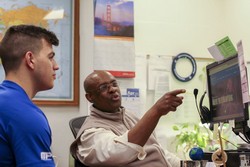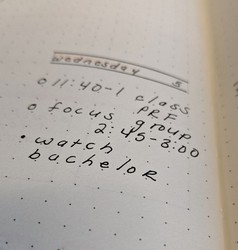“What do I want to do for the rest of my life?”
That is the question many first year students ask themselves when coming to college. Some people may know what they want to study, but for others, it is not that easy. 164 of 921 freshmen, or approximately 18 percent, are undeclared.
Such is the case of Naomi Louis, a freshman undeclared student. Louis thought this was the best choice for her, as she was unsure what would be the best major. “Upon entering, I had multiple majors I was contemplating and still am. I did not want to waste time on a major when I wasn’t even sure I would really like it,” she said.
Louis is an EOF (Educational Opportunity Fund) scholar and received guidance during her summer academy from EOF counselors. “The EOF counselors eased my nerves on going in undeclared amongst students who seemed like they knew what they wanted to major in,” she said. “People change majors all the time, they said. EOF recommended that I experiment and use my tools to gain a better understanding of what I want.”
Lori Lichter, a Student Development Counselor at Monmouth, works with undeclared sophomores and new transfer students. “It is NOT a bad thing to come in as ‘Undeclared,’” she agreed. “Most students change their minds at least once anyway. Exploration of one’s interests and values and all that is offered at Monmouth University is actually quite positive. Being ‘Undeclared’ also allows for researching the ties between the many majors offered and what can be done with them career wise post-college.”
Lichter also said that general education courses can help students figure out where their interests lie.
Already halfway done with her freshman year, Louis has made some progress in her curriculum and is on the right track. As part of her academic journey of exploring different paths, she took general education courses such as archaeology, historical studies, nutrition sciences, psychology, and English. Out of these classes, Louis has enjoyed historical studies and psychology the most.
“Psychology 101 gave me the foundation for child development, which is by far my favorite class that I’m taking this spring,” Louis said. “I’m currently enrolled in health strategies as an introductory course to the health studies major. I also am taking an introduction to social work to see if I would want to be a social work major.”
Louis said that Monmouth has been helpful in offering resources to help guide her to choosing a major. “When talking with my first-year advisor, we picked up classes that mirrored majors I was considering: health studies, social work, and psychology. As a result, we can cross off majors from my list that I now know I don’t like. I’ve been putting my time to good use and reaching out to learn more about specific majors and career paths.”
Thanks to the various introductory courses, she has an idea of what she may want to pursue.
“Currently, my aspiration is to become a speech-language pathologist, but I’m not sure which major would be most beneficial to me,” she said. “Health Studies as of now looks like the major that will prepare me the most for graduate school with its background in the sciences. However, psychology and even education are still on the table.”
Not only is she deciding on a major, but she is also looking at potential minors. “Since I know I want to minor in both childhood studies and communication sciences and disorders, I want to choose a major that will complement both—and possibly one that overlaps, so I don’t have to take extra classes,” she said.
Louis is also a member of the Council for Exceptional Children, an activity that has helped narrow down what she wants to do. “I one day hope to work with children, as that’s where my passion lies,” she said.
Lichter advised to keep an open mind when it comes to choosing your major. “Use resources available to you, and don’t be afraid to ‘test the waters.’ Experiential Education also helps-internships, volunteer experiences, community involvement, clubs, Study Abroad programs-all help to expand one’s horizons and help search for passions,” She said. “It is also recommended to get involved with campus clubs and activities, as these can help to develop interests, make connections, and rule out things that you thought you would like, but don’t enjoy as much as you thought you would.”
Knowing what you want to do for the rest of your life is no easy feat. There are many factors that can be considered when choosing a major. However, there’s one that dominates them all: passion.
PHOTO COURTESY of Casey Trautwein, Monmouth University




